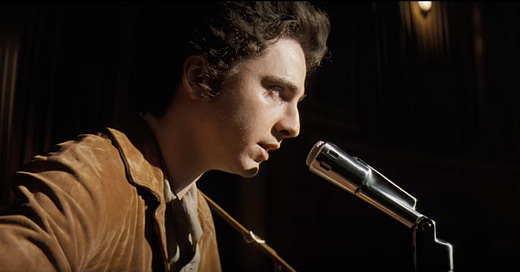‘A Complete Unknown’: In a biopic with purpose, Dylan goes electric and shakes up the old folkies
Film Review
It takes a little while to buy into Timothée Chalamet as quirky troubadour and American icon Bob Dylan, but once he gets you on the hook, it’s clear that the uncannily deep performance is certain to be one of the year’s best. I was never all-in with all the Chalamet love after he burst onto the screen in Luca Guadagnino’s “Call Me by Your Name” (2017) and received an Oscar nod for his part as young lover to an older partner. And yes, he shone as Hal in “The King” (2019), but in the “Dune” films he’s felt underweight as Paul Atreides, the man-boy turned messiah. With his turn as Bob, I’m done dithering – and did I mention he does all the singing of Dylan’s early ’60s catalog, nasal twang and all? It’s more than just a little impressive.
Departing from your typical cradle-to-grave biopic arc, writer-director James Mangold (“Heavy,” “Ford v Ferrari”) and co-writer Jay Cocks, working from Elijah Wald’s 2015 book “Dylan Goes Electric!” home in on Dylan’s ascent to notoriety and his transition from folk to electric rock, which caused a sizable stir at the 1965 Newport Folk Festival. Dylan reportedly had conversations with Mangold and offered some additional tidbits that got worked into the film. We begin with the young Bob visiting his idol Woodie Guthrie (Scoot McNairy, also onscreen as Amy Adams’ passive husband in “Nightbitch”) at a hospital where he’s battling Huntington’s disease and can’t talk. By his side is “If I had a Hammer” singer and Newport Fest organizer Pete Seeger (a nearly unrecognizable Edward Norton, knocking it out of the park as the solemn, mild-mannered folkie). Three legends, one small room.
The film flows like that: Dylan’s soulful sojourns cross paths with other era icons, sometimes collaborating and other times clashing. As the film has it, it’s Seeger among the crew trying to pull the plug on Dylan’s electric set late in the film. In between, much revolves around Dylan’s relationships with girlfriend Suze Rotolo, fictionalized as Sylvie Russo (Elle Fanning) to allow narrative flexibility and respect Rotolo’s memory and surviving family; and folk and feminist icon Joan Baez (played with vim and nuance by Monica Barbaro, whose stock is certain to rise in the wake of the film). It’s Baez who early on gives Dylan a big lift, bringing him on tour, and despite their romantic interludes has no qualms about calling him out for being a self-interested asshole.
Rock biopics are notoriously tricky. Without the artist or the artist’s estate behind the project, often the music is missing – see “Stoned” (2005, about Brian Jones) or “Stardust“ (2020, about David Bowie). This isn’t Dylan’s first treatment either, which would be Todd Haynes’ more abstract and cagey “I’m Not There” (2007), in which Cate Blanchett, Richard Gere and Heath Ledger are part of a six-actor rotation playing Dylan in different incarnations. Mangold’s take is more rooted, but both films are wise to seek the essence of Dylan and not attempt to provide answers into the slippery persona who, after becoming the only musician to win the Nobel Prize, skipped the ceremony and sent fellow rocker Patti Smith to perform a few Dylan works in his stead.
One of the finer strands in “A Complete Unknown” is the letters exchanged between Dylan and Johnny Cash (a brash Boyd Holbrook) and their meetups at Newport. Cash, whom Mangold framed with great success in “Walk the Line” (2005) with Joaquin Phoenix, is depicted as something of a Dylan agitator and muse who pushes him to push back on the folkies who want to keep Newport unplugged; his inclusion allows an uproarious scene one not-so-sober festival morn with Cash trying to park his Caddy by caroming and careening off the fenders and bumpers of other cars. The true gift of “A Complete Unknown” is its ability to transport the viewer via dreamy time machine, re-creating the era impressively but maintaining a tight focus.
If you feel the film meanders or is too myopic, that’s the point: It’s the young Bob Dylan wrestling with his roots, idols and place in the world. Little else bleeds in, and the film is not afraid to be critical of perhaps the greatest songwriter of the modern era. History does get manipulated some, but mostly for effect and efficiency, and Chalamet clearly did his homework, while the supporting cast of Norton, Barbaro, Holbrook and Fanning all strum along seamlessly in tune.






Great review! Totally agree - even about early Chalamet feelings.